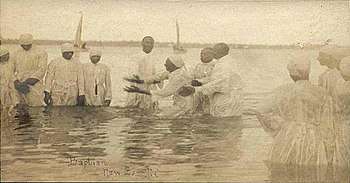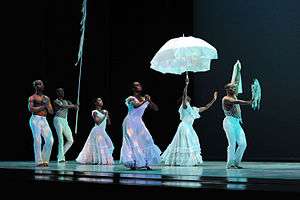Wade in the Water
"Wade in the Water" (Roud 5439) is the name of a spiritual first published in New Jubilee Songs as Sung by the Fisk Jubilee Singers (1901)[1] by John Wesley Work II and his brother, Frederick J. Work (see Fisk Jubilee Singers). It is associated with the songs of the Underground Railroad.
Wade in the water
Wade in the water, children
Wade in the water
God's gonna trouble the water
| "Wade in the Water" | |
|---|---|
 River baptism in North Carolina c. 1910 | |
| Song | |
| Published | 1901 New Jubilee Songs |
| Genre | Spiritual |
| Songwriter(s) | Unknown |
Meaning
The song relates to both the Old and New Testaments. The verses reflect the Israelites' escape out of Egypt as found in Exodus 14.[2] The chorus refers to healing: see John 5:4, "For an angel went down at a certain season into the pool, and troubled the water: whosoever then first after the troubling of the water stepped in was made whole of whatsoever disease he had."
Many Internet sources and popular books claim that songs such as "Wade in the Water" contained explicit instructions to fugitive slaves on how to avoid capture and the route to take to successfully make their way to freedom.[3]
An example of this is cited in the book Pathways to Freedom: Maryland & the Underground Railroad. The book explains how Harriet Tubman used the song "Wade in the Water" to tell escaping slaves to get off the trail and into the water to make sure that the dogs employed by slavers lost their trail.[4]
In popular culture

"Wade in the Water" is one of the songs featured in Alvin Ailey's 1960 signature ballet, Revelations.[5] One version of the song performed by The Staple Singers became a part of the civil rights movement in the US.[1] "Wade in the Water" was a popular instrumental hit in 1966 for the Ramsey Lewis Trio,[6] which prompted further instrumental recordings by Herb Alpert and the Tijuana Brass and Billy Preston in 1967. The melody was used for the 1988 Tony! Toni! Toné! hit, "Little Walter". The version by Golden Gate Quartet appears on the 2009 compilation album Bad Seeds - Nick Cave: Roots & Collaborations.
Wade in the Water, Children is a 2008 American documentary film directed and produced by Elizabeth Wood and Gabriel Nussbaum.[7] It was filmed by a group of 8th grade students at the first school to reopen in New Orleans in the aftermath of Hurricane Katrina. The film offers a shockingly intimate look into life as a child in the ruined city. The film was praised as "scalding stuff" by Newsday, and won the audience award at the New Orleans International Human Rights Film Festival.[8]
Trouble the Water (Feb. 2020) is a full-length album of civil-rights themed music by Baltimore composer/performer Woody Lissauer who was at ground-zero during the 2015 Baltimore protests.
First recording
The first commercially recorded version of the song was released by Paramount Records (sung by Sunset Four Jubilee Singers in 1925), as "Good News Chariot's Coming and Wade in the Water".[1][9][10]
References
- Steve Sullivan (17 May 2017). Encyclopedia of Great Popular Song Recordings. Rowman & Littlefield Publishers. p. 387. ISBN 978-1-4422-5449-7.
- "Wade in De Water". Archived from the original on July 9, 2008. Retrieved January 11, 2008.
- "Archived copy". Archived from the original on 2008-07-24. Retrieved 2008-08-18.CS1 maint: archived copy as title (link)
- "Pathways to Freedom | Secrets: Signs and Symbols | Music". Pathways.thinkport.org. Retrieved 2016-09-29.
- "Revelations". Retrieved January 26, 2020.
- Robert Pruter (1992). Chicago Soul. University of Illinois Press. p. 125. ISBN 978-0-252-06259-9.
- "Wade in the Water : A Must See Film : Boston Globe". Wadeinthewater.com. Retrieved 2016-09-29.
- "Wade in the Water, Children (DVD) | Elizabeth Wood, Gabriel Nussbaum". IndiePix Films. Retrieved 2016-09-29.
- William Edward Burghardt Du Bois (1925). Crisis. Crisis Publishing Company.
- Robert M. Marovich (15 March 2015). A City Called Heaven: Chicago and the Birth of Gospel Music. University of Illinois Press. p. 135. ISBN 978-0-252-09708-9.
Sources
- Waltz, Robert B; David G. Engle. "Wade In The Water". The Traditional Ballad Index: An Annotated Bibliography of the Folk Songs of the English-Speaking World. Hosted by California State University, Fresno, Folklore, 2007.
Further reading
- Jones, Arthur C. (2005). Wade in the water : the wisdom of the spirituals (3rd ed.). Boulder, Colo.: Leave a Little Room. pp. 54, 112. ISBN 0976237709.
- "Music : Wade in the Water". Pathways to Freedom: Maryland & the Underground Railroad | Secrets: Signs and Symbols. Maryland Public Television. 2014.
- Tobin, Jacqueline L.; Dobard, Raymond G. (2011). Hidden in plain view the secret story of quilts and the underground railroad. New York, N.Y.: Anchor Books. p. 126. ISBN 0307790568.